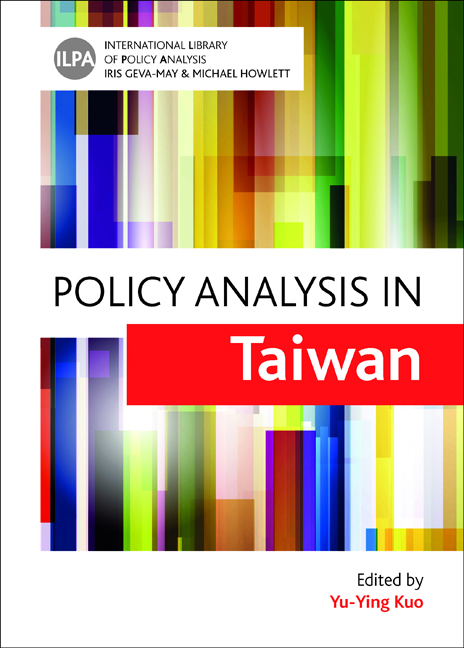Book contents
- Frontmatter
- Contents
- List of tables and figures
- Acknowledgements
- Notes on contributors
- One Policy analysis in a time of turbulence
- Two Exploring policy advisory committees in the central government
- Three Analysis of innovative local government policies in Taiwan
- Four Policy analysis in the legislative body: the legislative process of the Soil and Groundwater Pollution Remediation Act in Taiwan
- Five Policy analysis in the local councils
- Six Gendering policy analysis? The problems and pitfalls of participatory ‘gender impact assessment’
- Seven The power of influencing policies, or getting their share and more: interest groups in Taiwan
- Eight Think tanks in Taiwan
- Nine The development of public engagement in Taiwan
- Ten Social media and policy evolution in Taiwan
- Eleven Policy analysis by non-governmental organisations in Taiwan
- Twelve Policy network of universal healthcare reform in Taiwan
- Thirteen Public policy and administration research
- Fourteen Too critical to ignore? A tri-dimensional relationship examination of policy analysis internship in Taiwan
- Fifteen Policy analysis in Taiwan in an international perspective
- Sixteen Policy analysis education in Taiwan: a comparative perspective
- Index
Eight - Think tanks in Taiwan
Published online by Cambridge University Press: 11 March 2022
- Frontmatter
- Contents
- List of tables and figures
- Acknowledgements
- Notes on contributors
- One Policy analysis in a time of turbulence
- Two Exploring policy advisory committees in the central government
- Three Analysis of innovative local government policies in Taiwan
- Four Policy analysis in the legislative body: the legislative process of the Soil and Groundwater Pollution Remediation Act in Taiwan
- Five Policy analysis in the local councils
- Six Gendering policy analysis? The problems and pitfalls of participatory ‘gender impact assessment’
- Seven The power of influencing policies, or getting their share and more: interest groups in Taiwan
- Eight Think tanks in Taiwan
- Nine The development of public engagement in Taiwan
- Ten Social media and policy evolution in Taiwan
- Eleven Policy analysis by non-governmental organisations in Taiwan
- Twelve Policy network of universal healthcare reform in Taiwan
- Thirteen Public policy and administration research
- Fourteen Too critical to ignore? A tri-dimensional relationship examination of policy analysis internship in Taiwan
- Fifteen Policy analysis in Taiwan in an international perspective
- Sixteen Policy analysis education in Taiwan: a comparative perspective
- Index
Summary
Introduction
According to the 2012 Worldwide Think Tanks (WTT) Report (2013), there are about 6,545 think tanks currently operating worldwide. In McGann and Weaver (2002), think tanks are put into four typologies: (1) academic (university, excluding students); (2) contract researchers; (3) advocacy tanks; (4) party-oriented think tanks. From the aspect of funding resources, think tanks can be categorised as the following types: (1) government-funded; (2) partially government-funded; (3) Private sectorfunded; (4) International organisation-funded (Wu et al, 2009).
Of all the think tanks worldwide, 52 are in Taiwan (McGann, 2013). According to the 2012 WTT report, four Taiwanese think tanks are among the top 40 in the world. The history of think tanks in Taiwan can be considered a reflection of the country's political and economic path. Each think tank is set up in a specific era with specific missions reflecting the challenges and opportunities at that time. Their operations and activities are geared toward different research orientations based on their organisational missions, resources, and organisational structures.
Research organisation and orientation
In order to enhance understanding of think tanks in Taiwan, the discussion is focused on the following aspects. The chapter begins with brief definition of think tanks, tracing their historical development in Taiwan. Based on the different defined typologies of think tanks found in current studies in the field, the different orientations of various think tanks in Taiwan are briefly introduced. This is followed by a description of the designated purpose and function of think tanks in Taiwan. Finally, this chapter focuses on the contribution and influence of think tanks to public policy in Taiwan, and discusses how think tank staff position themselves with regard to policy making in Taiwan.
Methodology
Data collection approaches are through document analyses and interviews about these think tanks. Documents are downloaded from think tanks’ official websites. Five face-to-face in-depth interviews were conducted with current and former staff of relevant think tanks. Data analyses are based on the aforementioned designated research orientations.
The definition of think tank
Think tanks are public policy research institutes that provide research, independent analysis and advice on all aspects of policy-related issues. They are ‘independent, non-interested-based, nonprofit organizations that produce and principally rely on expertise and ideas to obtain support and to influence the policymaking process’ (Rich, 2004: 11).
- Type
- Chapter
- Information
- Policy Analysis in Taiwan , pp. 111 - 122Publisher: Bristol University PressPrint publication year: 2015



